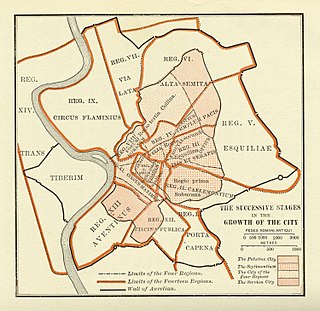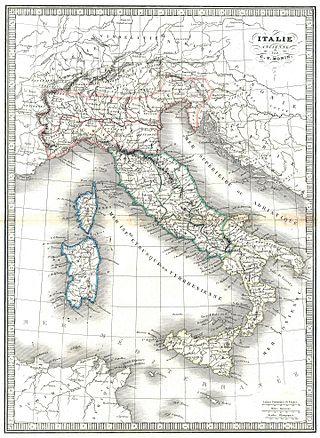Related Research Articles

The Roman calendar was the calendar used by the Roman Kingdom and Roman Republic. Although the term is primarily used for Rome's pre-Julian calendars, it is often used inclusively of the Julian calendar established by the reforms of the dictator Julius Caesar and emperor Augustus in the late 1st century BC.

The Roman Kingdom, also referred to as the Roman monarchy or the regal period of ancient Rome, was the earliest period of Roman history when the city and its territory were ruled by kings. According to tradition, the Roman Kingdom began with the city's founding c. 753 BC, with settlements around the Palatine Hill along the river Tiber in central Italy, and ended with the overthrow of the kings and the establishment of the Republic c. 509 BC.

The founding of Rome is a legendary event much embellished by later Roman myth. Archaeological evidence indicates that Rome was developed from earlier hilltop villages and was never so singularly founded. Habitation of the Italian peninsula goes back far into prehistory; evidence of settlement on the Capitoline hill goes back to 1700–1350 BC, in line with more general archaeological evidence of settled habitation c. 1600 BC. Evidence of graves on the site goes back to 1000 BC. Likely influenced by a trend for city-state formation emerging from Greece, these hilltop settlements agglomerated into a single polity by the later eighth century BC.

Jupiter, also known as Jove, is the god of the sky and thunder, and king of the gods in ancient Roman religion and mythology. Jupiter was the chief deity of Roman state religion throughout the Republican and Imperial eras, until Christianity became the dominant religion of the Empire. In Roman mythology, he negotiates with Numa Pompilius, the second king of Rome, to establish principles of Roman religion such as offering, or sacrifice.

The Sabines were an Italic people who lived in the central Apennine Mountains of the ancient Italian Peninsula, also inhabiting Latium north of the Anio before the founding of Rome.
Marcus Terentius Varro was a Roman polymath and a prolific author. He is regarded as ancient Rome's greatest scholar, and was described by Petrarch as "the third great light of Rome". He is sometimes called Varro Reatinus to distinguish him from his younger contemporary Varro Atacinus.

The gens Licinia was a celebrated plebeian family at ancient Rome, which appears from the earliest days of the Republic until imperial times, and which eventually obtained the imperial dignity. The first of the gens to obtain the consulship was Gaius Licinius Calvus Stolo, who, as tribune of the plebs from 376 to 367 BC, prevented the election of any of the annual magistrates, until the patricians acquiesced to the passage of the lex Licinia Sextia, or Licinian Rogations. This law, named for Licinius and his colleague, Lucius Sextius, opened the consulship for the first time to the plebeians. Licinius himself was subsequently elected consul in 364 and 361 BC, and from this time, the Licinii became one of the most illustrious gentes in the Republic.
Nexum was a debt bondage contract in the early Roman Republic. A debtor pledged his person as collateral if he defaulted on his loan. Details as to the contract are obscure and some modern scholars dispute its existence. It was allegedly abolished either in 326 or 313 BC.

Lucius Papirius Cursor was a celebrated politician and general of the early Roman Republic, who was five times consul, three times magister equitum, and twice dictator. He was the most important Roman commander during the Second Samnite War, during which he received three triumphs.

The gens Quinctia, sometimes written Quintia, was a patrician family at ancient Rome. Throughout the history of the Republic, its members often held the highest offices of the state, and it produced some men of importance even during the imperial period. For the first forty years after the expulsion of the kings the Quinctii are not mentioned, and the first of the gens who obtained the consulship was Titus Quinctius Capitolinus Barbatus in 471 BC; but from that year their name constantly appears in the Fasti consulares.

The (Second) Latin War was a conflict between the Roman Republic and its neighbors, the Latin peoples of ancient Italy. It ended in the dissolution of the Latin League and incorporation of its territory into the Roman sphere of influence, with the Latins gaining partial rights and varying levels of citizenship.
The gens Terentia was a plebeian family at ancient Rome. Dionysius mentions a Gaius Terentius Arsa, tribune of the plebs in 462 BC, but Livy calls him Terentilius, and from inscriptions this would seem to be a separate gens. No other Terentii appear in history until the time of the Second Punic War. Gaius Terentius Varro, one of the Roman commanders at the Battle of Cannae in 216 BC, was the first to hold the consulship. Members of this family are found as late as the third century AD.

The vocabulary of ancient Roman religion was highly specialized. Its study affords important information about the religion, traditions and beliefs of the ancient Romans. This legacy is conspicuous in European cultural history in its influence on later juridical and religious vocabulary in Europe, particularly of the Christian Church. This glossary provides explanations of concepts as they were expressed in Latin pertaining to religious practices and beliefs, with links to articles on major topics such as priesthoods, forms of divination, and rituals.
Publius Cornelius Scipio Asina was a Roman politician and general who served as consul in 221 BC, and as such campaigned against the Histri, a people in the northern Adriatic. Asina belonged to the Scipionic-Aemilian faction which dominated Roman politics at the beginning of the Second Punic War, and advocated for an aggressive policy against Hannibal. This stance led him to oppose the more prudent strategy of Fabius Maximus. He was notably appointed Interrex in 216 BC, probably in order to manipulate the elections.

The gens Juventia, occasionally written Jubentia, was an ancient plebeian family at Rome. After centuries of obscurity, the gens emerges into history with the appearance of Titus Juventius, a military tribune, in the beginning of the second century BC. The first of the Juventii to obtain the consulship was Marcus Juventius Thalna in 163 BC. But the family is renowned less for its statesmen than for its jurists, who flourished during the second century AD.
The gens Manilia was a plebeian family at ancient Rome. Members of this gens are frequently confused with the Manlii, Mallii, and Mamilii. Several of the Manilii were distinguished in the service of the Republic, with Manius Manilius obtaining the consulship in 149 BC; but the family itself remained small and relatively unimportant.
Quintus Poetelius Libo Visolus was a Roman politician, and member of the Second Decemvirate in 450 and 449 BC.
The gens Poetelia or Poetilia was a plebeian family at ancient Rome. Members of this gens are first mentioned in the time of the Decemvirs, and from thence down to the Second Punic War, they regularly held the chief magistracies of the Roman state. After this, however, they fade into obscurity, and are only occasionally mentioned. The nomen Poetelius is sometimes confused with Petillius, and can be found with either a single or double 'l'.
The gens Tremellia was a minor plebeian family at ancient Rome. Members of this gens are first mentioned towards the end of the Second Punic War, but the highest rank ever attained by any of the Tremellii under the Republic was that of praetor. After falling into obscurity during the first century BC, the fortunes of this family briefly revived under the Empire, when Gnaeus Tremellius was appointed consul suffectus in AD 21, during the reign of Tiberius.
Gaius Poetelius Libo Visolus was a Roman politician and general who lived in the mid-fourth century BC and served multiple times as consul.
References
- ↑ A. Arthur Schiller (1978). Roman Law: Mechanisms of Development. Walter de Gruyter. pp. 209–. ISBN 978-90-279-7744-1.
- ↑ Livy, History of Rome VIII.28, "The Perseus Digital Library". Retrieved on May 10, 2007.
- ↑ Varro. On the Latin Language: Book VII. Trans. Roland G. Kent. On the Latin Language I: Books V-VII. Cambridge, Massachusetts: Harvard University Press, 1938. pp. 359-361